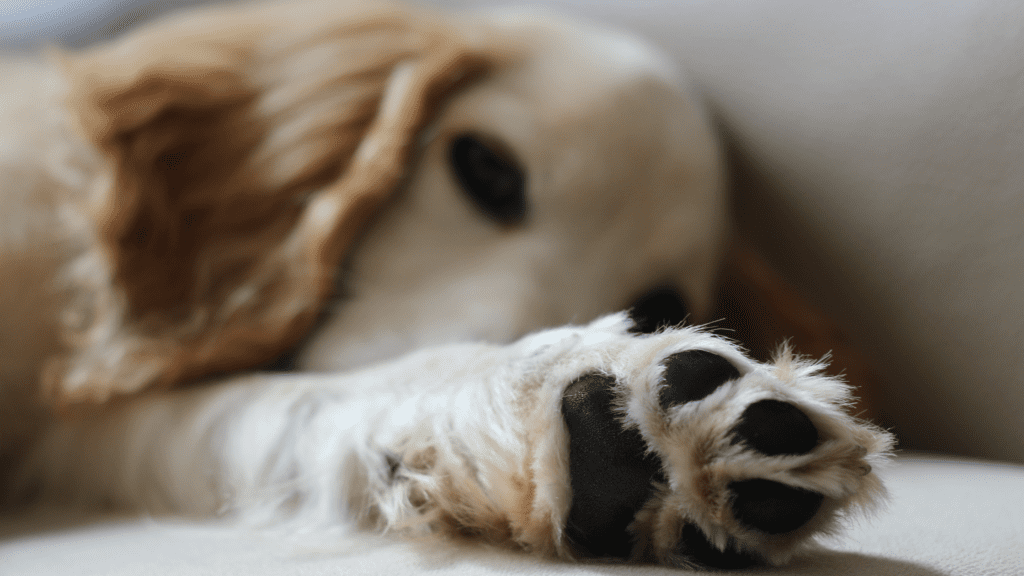Why Do Dogs Smell Like Fritos? The Truth Behind Frito Feet!
Ever noticed your dog smells like Fritos, especially their paws? If you’ve ever asked, “Why does my dog smell like Fritos?” or “Why do dogs’ feet smell like Fritos?”—you’re not alone! Many dog owners find this peculiar yet oddly pleasant scent intriguing. Surprisingly, this corn chip-like aroma is caused by natural bacteria and yeast that live on your dog’s skin, particularly on their paws.
Did you know? A study by the American Veterinary Medical Association found that dogs’ paws harbor over two dozen different types of bacteria, contributing to their unique scent.
This article dives deep into why dogs smell like Fritos, what causes this phenomenon, whether it’s normal, and what you can do if the smell becomes too strong.

What is Frito Feet in Dogs?
Frito Feet is a common condition caused by the build-up of bacteria and yeast on your dog’s paws. This build-up happens naturally but is sometimes exacerbated by environmental factors, poor hygiene, or underlying health issues.
Why Is It Called “Frito Feet”?
The name comes from the distinct odor that resembles the smell of Frito corn chips. It’s a quirky way of describing something that’s part of many dog owners’ experiences, yet few know the underlying cause.
Why Do Dogs Smell Like Fritos?
If your dog smells like Fritos, it’s because of natural bacteria and yeast on their skin. The combination of Proteus and Pseudomonas bacteria, along with sweat and natural oils, creates that distinctive corn chip aroma. This smell is more noticeable on a dog’s paws, where these bacteria thrive due to warmth and moisture.
What Causes the Frito-Like Smell in Dogs?
1. Natural Bacteria
Dogs have bacteria living on their skin at all times. Two bacteria responsible for the Frito smell are:
- Proteus bacteria – Known for its slightly sweet, corn-like odor.
- Pseudomonas bacteria – Contributes to the earthy, slightly musty scent.
2. Sweat Glands in Paws
Dogs sweat through their paw pads, and this moisture creates the perfect environment for bacteria to flourish. Unlike human sweat, dog sweat contains proteins and oils that interact with bacteria, producing this unique smell.
Symptoms of Frito Feet
Identifying the Frito Smell
The most obvious sign of Frito Feet is the smell. If your dog’s paws emit a distinct odor that reminds you of corn chips or popcorn, it’s likely due to this bacterial build-up.
Other Signs of Foot Infections
While Frito Feet is mostly harmless, other symptoms like redness, swelling, excessive licking, or pus can indicate a more serious infection that needs veterinary attention.
How Common Is Frito Feet in Dogs?
Why Most Dog Owners Face This Issue
Frito Feet is extremely common. Most dogs will experience this at some point, especially if they are active, spend time outdoors, or are in humid environments.
Types of Dogs Prone to Frito Feet
Dogs with folds or creases in their skin, such as Bulldogs or Basset Hounds, may be more prone to smelly feet due to their anatomy. Dogs that spend a lot of time outdoors or in damp environments are also at higher risk.
Is It Normal for Dogs to Smell Like Fritos?
| Smell Strength | Possible Cause | Action Needed? |
| Mild & Occasional | Natural bacteria & sweat | No action needed |
| Strong & Persistent | Excess bacteria growth | Improve paw hygiene |
| Very Strong & Sour | Yeast infection | See a vet |
Most of the time, a mild Frito smell is completely normal and harmless. However, if the smell becomes overpowering, it could indicate an underlying issue.
Is Frito Feet Harmful to My Dog?
Differentiating Between Normal and Concerning Smells
In most cases, Frito Feet is harmless and just a quirky side effect of your dog’s natural bacteria. However, if the smell is strong or accompanied by other symptoms like itching or limping, it’s important to get it checked out.
Risks of Ignoring Frito Feet
While Frito Feet itself isn’t dangerous, ignoring proper paw hygiene can lead to infections, cracks in the paws, and more serious issues down the line.

Factors That Make the Frito Smell Stronger
1. Diet & Nutrition
Certain diets rich in carbohydrates or processed foods can lead to changes in skin oils, enhancing bacterial growth and odors.
2. Lack of Paw Hygiene
Dirt, moisture, and not wiping paws regularly can make the Frito smell stronger.
3. Moist Environments
Dogs who frequently walk on wet grass, muddy areas, or lick their paws excessively are more prone to stronger odors.
How to Reduce or Eliminate the Frito Smell
Regular Paw Cleaning Routine
One of the easiest ways to combat Frito Feet is by regularly cleaning your dog’s paws. Use a damp cloth or dog-safe wipes to clean between their toes and around their paw pads.
Using Dog-Safe Cleaning Products
Make sure to use cleaning products specifically designed for dogs. Human soaps and shampoos can be too harsh for their sensitive skin and can actually make the problem worse.
| Solution | Effectiveness | How Often? |
| Regular paw cleaning | High | Daily |
| Using dog-friendly wipes | Medium | As needed |
| Drying paws thoroughly | High | After walks |
| Changing diet | Medium | As per vet’s advice |
Natural Remedies for Smelly Dog Paws
Apple Cider Vinegar Paw Soaks
Apple cider vinegar has natural antibacterial and antifungal properties. Soaking your dog’s paws in a diluted apple cider vinegar solution (1 part vinegar to 2 parts water) can help reduce the bacteria causing the odor.
Epsom Salt Solutions
Soaking your dog’s paws in a warm Epsom salt bath can help soothe irritation and reduce bacteria build-up.
How to Properly Clean Your Dog’s Paws (Step-by-Step Guide)
- Fill a shallow bowl with warm water and mild dog shampoo.
- Soak each paw for 30 seconds.
- Scrub gently using a soft cloth.
- Rinse thoroughly and dry completely with a towel.
- Apply coconut oil or pet-safe moisturizer to prevent cracking.
When to See a Vet
Signs of Infections
If you notice any swelling, redness, or persistent licking of your dog’s paws, it might be a sign of an infection. At this point, it’s best to consult your veterinarian for further guidance.
Chronic or Severe Smelly Feet
If the Frito smell is overwhelming or doesn’t go away with regular cleaning, it could be a sign of a deeper issue like a yeast infection, and veterinary advice is recommended.
Diet’s Role in Frito Feet
Can Poor Diet Cause Frito Feet?
A dog’s diet can impact the overall health of its skin and coat, including its paws. Poor-quality food lacking essential nutrients may contribute to skin conditions that can exacerbate Frito Feet.
Foods That May Help
Including omega-3 and omega-6 fatty acids in your dog’s diet can help promote healthy skin and prevent bacterial overgrowth on their paws.
Conclusion
While Frito Feet might seem like a quirky part of being a dog owner, it’s important to maintain proper hygiene to keep your dog’s paws healthy and smelling fresh. Regular cleaning, natural remedies, and paying attention to signs of infection will go a long way in ensuring that your dog’s paws remain in tip-top condition.
Pro Tip:
Sprinkle a small amount of cornstarch on your dog’s paws before bedtime to absorb excess moisture and keep bacteria in check!
FAQs
1. Can Frito Feet Spread to Other Parts of the Dog’s Body?
No, Frito Feet is usually localized to the paws, but neglecting hygiene can lead to infections that may affect other areas.
2. How Often Should I Clean My Dog’s Paws?
Ideally, you should clean your dog’s paws after every walk, especially if they’ve been in muddy or wet areas.
3. Are Certain Dog Breeds More Prone to Frito Feet?
Yes, dogs with skin folds, like Bulldogs, or those with long fur between their toes may be more susceptible.
4. What Are the Best Products for Cleaning My Dog’s Paws?
Dog-safe wipes, shampoos, and sprays with antibacterial and antifungal properties are best for maintaining clean paws.
5. Can Frito Feet Be Caused by Environmental Factors?
Yes, humid environments or areas where your dog frequently walks on wet ground can contribute to Frito Feet.

